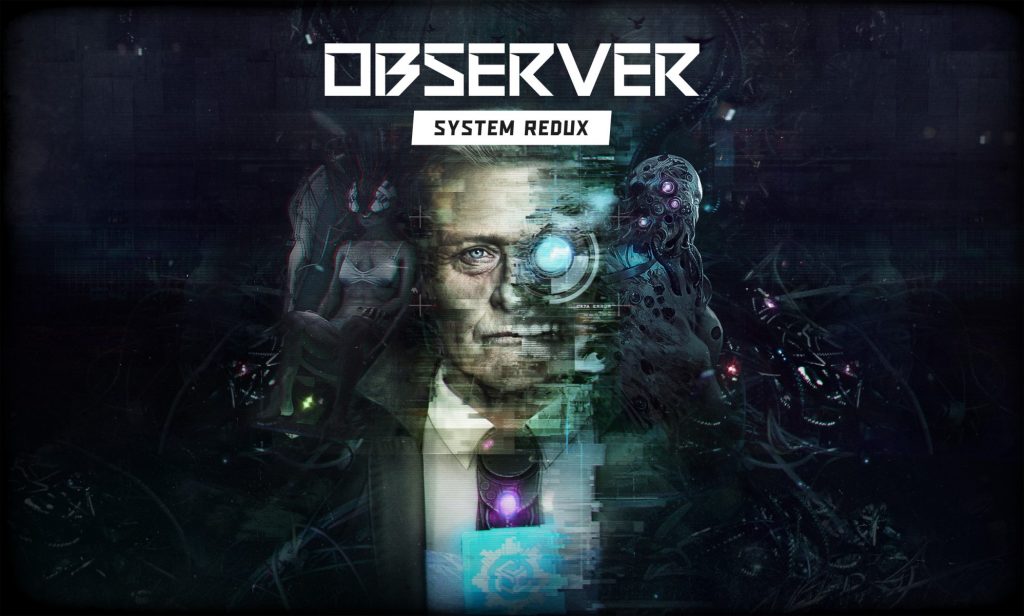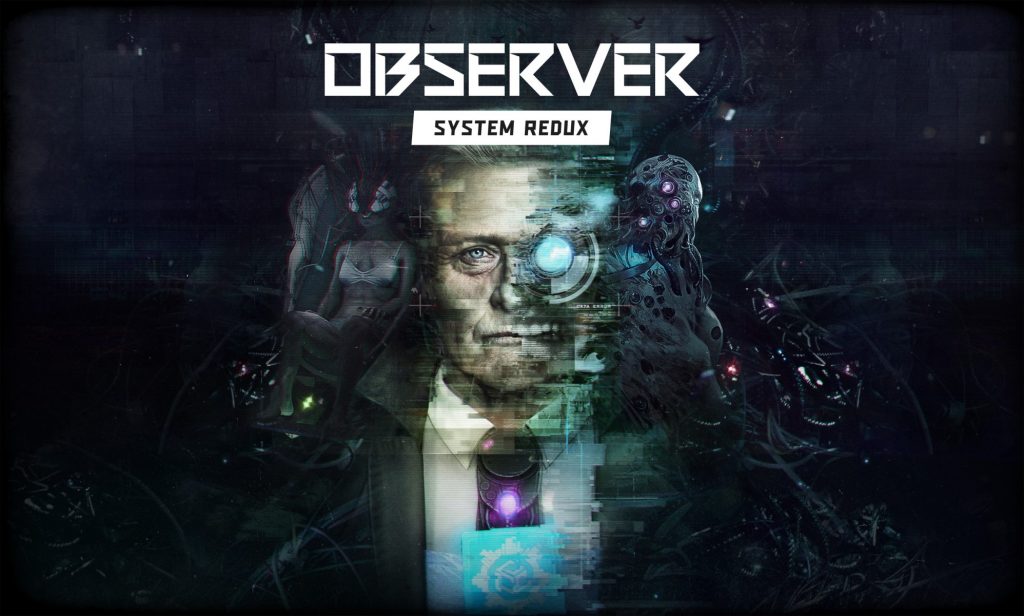
When Observer was originally released in 2017, it stood out thanks to its hodgepodge of ideas. It was a first-person adventure game that combined the Bladerunner aesthetic with horror atmosphere. It was unique for most walking-sim adventures, because it would jump around gameplay styles with mini-games.
Like Bloober Team’s prior game, Layers of Fear, Observer made use of spatial distortion. This effect was utilized heavily during the brain-hacking sequences, where the protagonist would uncover clues by experiencing abstracted events of the host’s conscience.
With Observer: System Redux, the developers sought to revamp the visuals and re-integrate cut content. Compounded with gameplay tweaks to further smooth the experience, and utilizing the power of next generation consoles, is this the definitive version of the cyber-nightmare?
Observer: System Redux
Developer: Bloober Team / Anshar Studios
Publisher: Bloober Team S.A.
Platforms: Xbox Series X/S (reviewed), Microsoft Windows, PlayStation 5
Release November 10, 2020
Players: 1
Price: $29.99
Observer: System Redux makes a very strong first impression. The boys at Bloober Team have honed their craft at meticulously constructing immersive settings. While Observer looked decent for a indie developed Unreal 4 project, System Redux manages to look AAA.
Observer is set in a decrepit cyberpunk dystopia. The lighting mixed with smoky air and condensation everywhere makes your skin feel itchy and oily, evoking the used and lived future set by classic sci-fi films and anime like Bladerunner, Ghost in the Shell, and Akira.
Even though the game is set in a run down apartment with a few glimpses into the minds of a few tenants, there is a profound sense of a much larger world. All the world building tricks are at play; from the abundance of intrusive advertisements to the cyborg plague and utter dehumanization, 2084 Poland is depressingly bleak.
After getting acquainted to the dilapidated and depraved setting, players will find themselves in the floppy shoes of Daniel Lazarski, played by Rutger Hauer. Dan is an observer, a special kind of detective that invades the minds of people to find clues. His story begins long after a plague had wiped out most of the world’s population.
Daniel has been estranged from his son for some time. The scenario does not ever show this, and all the information has to exposited from dialogue with NPCs who you never see or with Janus the shell-shocked cyborg.
The protagonist’s motivation to go to the apartment complex where the story unfolds is sloppily explained, and the pay-off doesn’t feel earned. This might be due to the lightness of the overall scenario and how few characters are involved since everyone, other than Janus, is dead.
The façade of the lock-down in the building quickly wears thin, and becomes a detriment to the beautifully crafted atmosphere. This was likely a limitation on the developers, since the original game was made with a small team with little money.
At first it feels unnerving to explore such a filthy and rotten looking hovel. After while the novelty wears off, and you begin to wonder how the place got so dirty when there are hardly any people around at all. All the tenants exist as disembodied voices coming out of a boxes with no face.
This was a compromise a small developer had to make to make their world feel real. It is a short hand technique that ultimately fails to deliver. Having conversations with doors is visually dull, and the dialogue choices that Dan can make only are an illusion of choice, with no real consequences.
Observer’s core gameplay is of the walking-sim variety. Dan has no side-arm, since observers tend to lose their minds as an occupational hazard, and he is played by then 70 year-old Hauer. Dan is already a feeble grandpa who has to constantly take medication for his implants and the baggage that comes with “observing”.
As Dan, players will have to navigate and explore the apartment complex and scrounge for clues. This means interacting with the environment, pulling switches, hacking keypads, plugging cables, and sometimes following a trail. He can augment his vision to track biological matter or electromagnetism, which dumbs down having to do much searching in crime scenes.
Toggling between these vision modes will highlight whatever Dan needs to find, so that actual grandmas can play. Using the vision modes come at no cost of Dan’s synchronization, so he is free to abuse this technology. The augmented vision is disabled during the mind-jacking, which is a missed opportunity to mess with the heads of players.
Daniel may have initially come to the stacks to find his son, but he finds he was embroiled in corporate espionage. While locked inside the building, Dan will have to solve many cases that will lead him closer to his estranged son. Some of these cases are optional, and only serve to add to the setting and lore.
The cases that were seamlessly integrated into the game are especially inconsequential, and it is obvious why they got axed. It is neat that they’ve been restored, and do make the System Redux feel a bit more dynamic than the first version.
When not rummaging through garbage in some degenerate’s sex dungeon or trying to figure out some esoteric sci-fi contraption, Dan will be plumbing the depths of the minds of persons of interest. During these sequences is where Observer is able to break away from the iterative cyberpunk dystopia, and express surreal or otherwise nightmarish imagery while mixing up gameplay.
While exploring these abstract visions, Dan won’t have to worry about doing his detective work, and is tasked to merely make it to the end. Sometimes there are space distortion that defy the laws of physics, and there may be a puzzle tied to breaking free from an endless loop.
Most of the time, players will bumble around trying to process what they are seeing, only to be automatically shunted to the next set-piece. It becomes hard to get immersed while exploring these moments, since the visuals often get very busy and you don’t have much control over where you are going.
After a while, the constant barrage of intense and nightmarish imagery becomes tedious and boring. The game becomes like an eager teenager, fumbling around in a sticky backseat, desperate for an amorous encounter. Interest wanes, but then it dawns that you are locked in, and the only way out is to go along with it and get it over with.
As the headache inducing and whiplashing nightmares go on, Dan may find himself having to do brief stealth sections. The game does not communicate or telegraph that there is a stealth sequence going, and it is very possible to embarrassingly walk right up to the boogey man and get a game over.
Bypassing a sneaking set-piece by accident is also possible. One sequence tasks Dan with operating multiple terminals to open a passage forward. It is very easy to negotiate this challenge without even being aware that there is a game ending threat lurking around.
Due to the business of the nightmare worlds, it’s even harder to notice these threats. The environments are littered with flickering lights blinking in and out of existence to give the impression of the mind fading away, but the stalker will also be overly designed with similar features, making it difficult to identify.
These visions are a mixed bag. Most of the time they go on for far too long after you can gleam enough info from being hit over the head with obvious metaphors. Other times, they convey some of the most interesting visuals that System Redux has to offer.
As the story goes on, Dan’s grip on reality makes it harder for him to cope with the experience of brain-hacking. The line between reality begins to blur and for a moment, Observer truly embodies an actual psychological horror story. Sadly, this is a plot point that is never paid-off in either of the two bad endings.
When a horror game has multiple endings, the hardest to earn ending is typically the more emotionally satisfying ending. Observer: System Redux does not let the player work for a good ending. There are only two terrible choices that the game offers the player at the very end of the game. When it is over, you feel burned for all the seizure inducing nightmares you had to endure.
Why was Rutger Hauer cast as Daniel Lazarski? Was it to add legitimacy to Observer‘s Bladerunner influences? The developers went through the trouble of modeling Daniel to resemble the late actor, and he is borderline faceless. Even worse, Rutger couldn’t sound less interested and bored while reading his lines. In some readings, he sounds like he is about to take a nap.
The rest of the cast deliver very over the top and cartoony performances, which clashes with the gritty and depressing tone. Accents are all over the place, with some characters sounding like stereotypical New Yorkers or angry Bostonians. The issue with this is that Observer is set in Poland, leaving Janus as the only character who is the closest to being authentic; and even then he is portrayed by a Dutch actor.
The sound design is high caliber. There is seemingly dozens of layers of sounds that make the game feel more real. Every sound and piece of music exists within the game’s world. Atmospherics like a distant buzzing of fluorescent lights, murmuring of tenants, and drips of moisture make the places like the basement feel real and unwelcoming.
For all of its impressive dedication to the art department, System Redux has an unimpressive character model for Daniel’s full-body awareness. Looking down reveals a very awkwardly animating body that moves like something from two game generations ago.
The unrefined body model also hampers gameplay, since it has spotty collision that gets caught on the world’s 3D geometry. Sometimes it’s difficult to move Dan through tight spaces, which is most of the because of how claustrophobic it has been designed to be.
Daniel’s hands go into a goofy praying mantis position when he crouches and he never physically touches objects he picks up. This shorthand for interaction could be forgiven for the first edition of Observer, but System Redux is supposed to be a leading the way on next generation consoles. As the visuals get more advanced and realistic, shortcuts like this are becoming more distracting.
Observer is a concept that is full of great ideas on paper, but is held back by factors like lack of staff, budget, and vision. As an homage to their favorite cyberpunk media, it is impressive with its visuals and attention to detail. As a game, it is another walking-sim that ticks all the checkboxes and squanders potential concepts because the game had to be a walking-sim.
Players can’t do any actual detective work since every clue is highlighted with augmented reality, and none of the conversation choices matter at all. There are no consequences for any action, and the best the game has for moral choices involves a pig wearing a VR headset. It is like a more superficial and less cerebral Soma.
If you are wowed by grimy and disgusting but beautifully realized cyberpunk aesthetics, then Observer: System Redux is worth your time since that is all it has to offer. This is a horror game for tourists, since there are no actual stakes, and if you die there is almost no progress lost. It is made to make you feel smart; you don’t have to actually be smart to solve the mystery or the puzzles.
Observer: System Redux was reviewed on Xbox Series S using a review code provided by Bloober Team S.A.. You can find additional information about Niche Gamer’s review/ethics policy here.
